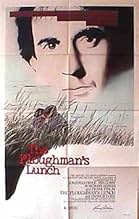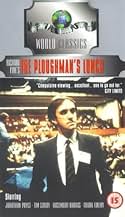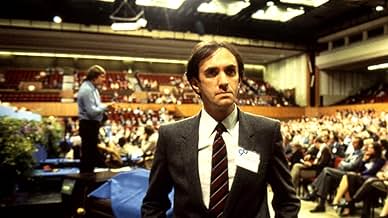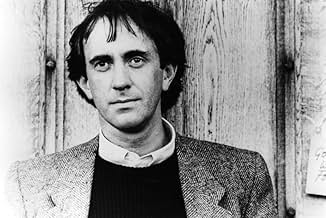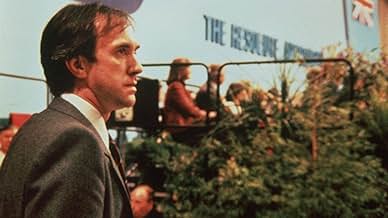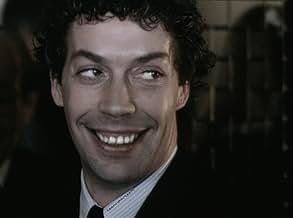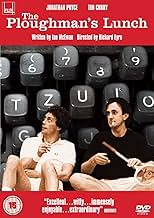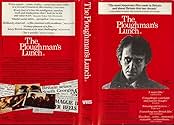IMDb RATING
6.2/10
534
YOUR RATING
James Penfield (Jonathan Pryce) has made a career out of journalism. Now bankrupt, he finds himself with a group of other writers in the middle of the dispute-ridden British homeland at the ... Read allJames Penfield (Jonathan Pryce) has made a career out of journalism. Now bankrupt, he finds himself with a group of other writers in the middle of the dispute-ridden British homeland at the time of the Falklands War.James Penfield (Jonathan Pryce) has made a career out of journalism. Now bankrupt, he finds himself with a group of other writers in the middle of the dispute-ridden British homeland at the time of the Falklands War.
- Nominated for 1 BAFTA Award
- 1 win & 1 nomination total
Robert Cartland
- Editor
- (as Bob Cartland)
- Director
- Writer
- All cast & crew
- Production, box office & more at IMDbPro
Featured reviews
I am a huge fan of Richard Eyre's work on stage and think he did a masterful job running the National Theatre for all those years. However, both the movies he has directed that I have seen (this one and Iris) are flawed. I think his style of directing might not suit film. There are several passages of the film that neither progress argument, nor develop characters nor set atmosphere effectively.
I am also a big fan of Ian McEwan's writing. This story is full of interesting material. Some of it could come across better - especially the double crossing in the various love interests and the echo of the Suez crisis therein. This might come down to the screenplay or perhaps the directing again.
But stick with it.
The scene in the pub during which Frank Finlay explains to Jonathan Pryce the origins of the ploughman's lunch is superb. The ghastly hermetically sealed cheese chunks on their plates providing a visual to Finlay's words.
We live in a society where we constantly reinvent the past in our attempts to shape the future as we want it. This is a key lesson in the film on all its many levels - the several love interests, Pryce's dereliction of family duty, the Falklands War and the Suez Crisis.
This is a fascinating piece. All the characters are ghastly, especially Jonathan Pryce's well-crafted central character. The standard of acting is consistently high. Despite the flaws, it is well worth seeing.
I am also a big fan of Ian McEwan's writing. This story is full of interesting material. Some of it could come across better - especially the double crossing in the various love interests and the echo of the Suez crisis therein. This might come down to the screenplay or perhaps the directing again.
But stick with it.
The scene in the pub during which Frank Finlay explains to Jonathan Pryce the origins of the ploughman's lunch is superb. The ghastly hermetically sealed cheese chunks on their plates providing a visual to Finlay's words.
We live in a society where we constantly reinvent the past in our attempts to shape the future as we want it. This is a key lesson in the film on all its many levels - the several love interests, Pryce's dereliction of family duty, the Falklands War and the Suez Crisis.
This is a fascinating piece. All the characters are ghastly, especially Jonathan Pryce's well-crafted central character. The standard of acting is consistently high. Despite the flaws, it is well worth seeing.
The Ploughman's Lunch is a very interesting movie. It is rather slow sometimes, and some of the lost interest ideas could have been a little better developed. But if you do stay with it, it is a fine movie. The movie is very well made, with stylish camera shots without being too fancy and fine location shooting. The direction is very skilled while never flashy, the story is compelling with a superbly staged and written scene in the pub between Jonathan Pryce and Frank Finlay and the writing is superb. The characters are even more fascinating, especially Pryce's. Ghastly but deliberately so. The acting especially from Pryce and Rosemary Harris is uniformly excellent. Overall, a fine and interesting film, that is worth sticking with even with the pace. 8/10 Bethany Cox
Always intelligent, but hardly cinematic, this is certainly an interesting film, but not fully entertaining.
I saw it on release and again for the second time this week and the lasting impression is a dog's dinner of ideas. At the centre there is a doomed romance, overlaid with a smorgasbord of messages inter-weaved in the script.
I shall attempt to list these message here.
a) The long term decline of Britain's importance in the world, b) the folly of the Suez expedition and a sort of oblique parallel with the Falklands War which doesn't work - Suez was a disaster, the Falklands campaign successful, c) the emotional toughness/nastiness of the Thatcher government, d) the Greenham Common anti-nuclear encampment (not sure what this is doing in the film), e) the lies sold by advertising, f) the bias inherent in the way we rewrite history, g) the English class system, h) the emotional coldness of journalists. Phew!
Added on to this, we have the conundrum of our hard to like hero James Penfield who wants love, but does not show it to those who love him. Crucially, he is foolishly chasing a snooty, upper (ruling) class girl whose own frivolous behaviour seems to be a comment on Britain's decline.
The real shame is that there are some fantastic parts to the film. Rosemary Harris is just perfect as the love seeking historian. And, then there is the cinema magic of filming the denouement to the central romance within the real-life setting of the Conservative Party Conference. With a few changes this film could have been up there with Performance and Brief Encounter, instead of an obscure curio of British cinema.
Spectacular balancing act between fact and fiction, public and private, greedy, ambitious Thatcherites and vacuous upper class specimen of the gauche caviar. The "Ploughman's lunch" is extremely tightly narrated and manages to make the spectator interested in the sorts of a bunch of not really likeable characters and their struggles for love, sex and power.
This is "Wall Street" in European and ultra-minor key version and a formidable depiction of the Eighties and their political and social contradictions.
Hope I haven't made it sound boring, because it isn't -- it's wryly, dryly funny, without even so much of a wink to the spectator, and dissects his protagonists with surgical precision.
Hope I haven't made it sound boring, because it isn't -- it's wryly, dryly funny, without even so much of a wink to the spectator, and dissects his protagonists with surgical precision.
That's my question! Rosemary Harris who has appeared on stage, films, and television with great respect, accolades and honors still hasn't received Damehood yet like Judi Dench, Maggie Smith, and yet she is as good and even sometimes better than her contemporary British counterparts. It's one of the reasons I picked up this little film at the drugstore for five dollars. Jonathan Pryce still hasn't been honored yet but I'm sure he will. I could Rosemary Harris in anything. I'm glad that people are recognizing her more since she played the Aunt in Superman but still it's not enough. Rosemary Harris plays Ann, a mature older woman, who has her sights set on Pryce's James Penfield, a troubled journalist. The film is set in the 1980s during the peak of Margaret Thatcher's term as the country's prime minister. I was pleased to see parts of London like Brixton, Brighton, and Norfolk actually be used as locations rather than just saying they were there. The plot is thin but I think Rosemary's BAFTA nominated performance makes up for it anyway. She's still heartbreaking and brilliant.
Did you know
- TriviaPart of this movie, towards the end, was set at the Conservative Party annual conference in Brighton in 1982, and was actually filmed at that event. In one shot at the conference, Penfield is seen lighting a cigarette amongst a crowd of conference delegates, and just behind his right shoulder is John Major, who succeeded Margaret Thatcher as Prime Minister.
- GoofsThe film gives thanks to "The Women of Greenham Common," who presumably inspired the peace-camp near where James Penfield (Pryce) gets his flat tyre. The Greenham women's peace-camp had indeed been the first of its kind, near Newbury in Berkshire, and very newsworthy in the early eighties, both for its feminist leadership and its unmovable resistance to the stationing of nuclear weapons - part of NATO's nuclear umbrella initiative - on a site of formerly common land.
However, this would be an entirely illogical route for Penfield to have taken back to London (even to TV studios in W12). He would have had to skirt London anticlockwise to the West on a ninety minute spiral detour along relatively minor roads (the M25 had huge sections yet to be constructed, whilst the M11 was already a swift route from Cambridgeshire toward Central and West London and/or Brixton).
Far more appropriate, given Ian McEwan's strong sense of geographical location, would be a similar peace-camp then starting up just outside RAF Lakenheath near Thetford in Norfolk. Penfield's route from the North Norfolk Coast (by then already popular with arty types seeking a bolthole away from London) would have taken him right past the perimeter early on. From footage of the jets taking off, and the stated fact that the film was "filmed entirely on location in London, Brighton and Norfolk," this seems likely to be the actual location for the filming of that scene.
- ConnectionsReferenced in No 73: The Disagreement (1983)
Details
- Release date
- Country of origin
- Language
- Also known as
- The Ploughman's Lunch
- Filming locations
- Production companies
- See more company credits at IMDbPro
Contribute to this page
Suggest an edit or add missing content



